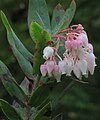Arctostaphylos obispoensis
| Arctostaphylos obispoensis | |
|---|---|

| |
| Scientific classification | |
| Kingdom: | Plantae |
| Clade: | Tracheophytes |
| Clade: | Angiosperms |
| Clade: | Eudicots |
| Clade: | Asterids |
| Order: | Ericales |
| Family: | Ericaceae |
| Genus: | Arctostaphylos |
| Species: | A. obispoensis |
| Binomial name | |
| Arctostaphylos obispoensis | |
Arctostaphylos obispoensis is a species of manzanita, known by the common names bishop manzanita and serpentine manzanita, endemic to California.[2]
Distribution
The plant is endemic to the southern Santa Lucia Mountains, in the Central Coast region of California.[2] It is found primarily in San Luis Obispo County, and extends into southern Monterey County.[2][3]
It grows in chaparral and closed-cone pine forest habitats, usually on serpentine soil. It is found at elevations of 60–950 metres (200–3,120 ft).[4]
- Conservation
It is protected within the Cuesta Ridge Botanical Special Interest Area of the Los Padres National Forest, growing in the endemic Sargent cypress (Cupressus sargentii) forest.[5] The species is listed on the California Native Plant Society Inventory of Rare and Endangered Plants as a rare but not currently endangered species.[6]
Description
Arctostaphylos obispoensis is an upright shrub or multi-trunked tree growing to 1–4 metres (3.3–13.1 ft) in height.[2][4]
The small branches and newer leaves are woolly. The mature leaves are glaucous-gray, hairless, and oblong (northern range) to widely lance-shaped (southern range), and up to 4.5 centimeters long.[4]
The inflorescence is a dense cluster of white urn-shaped and downward facing "manzanita" flowers.
The red fruit is a round waxy drupe, 9–14 millimetres (0.35–0.55 in) in diameter.[4]
See also
- Arctostaphylos luciana — range adjacent on west side of Cuesta Ridge
- Arctostaphylos pilosula — range adjacent on east side of Cuesta Ridge
- Natural history of the California chaparral and woodlands
- Leaning Pine Arboretum
- Ericaveae Bishop Manzanita Arclostaphylos obispoensis
- Arctostaphylos obispoensis—San Luis Obispo manzanita
- Arctostaphylos obispoensis Manzanita Mug Shot No. 66
- Arctostaphylos obispoensis Manzanita Mug Shot No. 66
References
- ^ "NatureServe Explorer - Arctostaphylos obispoensis". NatureServe Explorer Arctostaphylos obispoensis. NatureServe. 2022-05-30. Retrieved 30 May 2022.
- ^ a b c d "Field Guide to Manzanitas," Michael Kauffmann, Tom Parker, & Michael Vasey, Backcountry Press, 2015, ISBN 978-1-941624-02-9, page 98.
- ^ Calflora: Distribution map
- ^ a b c d Jepson
- ^ Los Padres National Forest: Cuesta Ridge Botanical Special Interest Area
- ^ CNPS, Rare Plant Program. 2016. Inventory of Rare and Endangered Plants (online edition, v8-02). California Native Plant Society, Sacramento, CA. — Arctostaphylos obispoensis . accessed 1.16.2016.
External links
 Media related to Arctostaphylos obispoensis at Wikimedia Commons
Media related to Arctostaphylos obispoensis at Wikimedia Commons Data related to Arctostaphylos obispoensis at Wikispecies
Data related to Arctostaphylos obispoensis at Wikispecies- Calflora Database: Arctostaphylos obispoensis (Bishop manzanita, Serpentine manzanita)
- Jepson Manual eFlora (TJM2) treatment of Arctostaphylos obispoensis
- USDA Plants Profile for Arctostaphylos obispoensis (serpentine manzanita)
- UC Photos gallery — Arctostaphylos obispoensis






